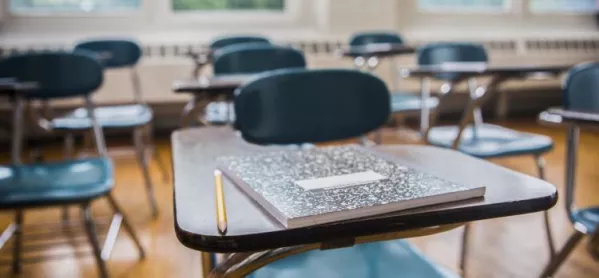“Clap clappity clap clap…Right arms in the air.
“Eyes on me! Not the window - me! Not him - me!
“Everything on the table. Absolute focus… are we there yet? I’ll wait...”
Classroom routines like this are part of a teacher’s DNA. They help us say: “This is my classroom and I am in charge.”
They make it clear: you are my students and my hard-won authority is born of tough love, infinite patience and a desire to help you be the best young people you can possibly be.
The pupils don’t see it this way, of course. They fight the routine of school whenever they can: gum hidden in the cheek (as if that one will fool me), odd-coloured socks to get around uniform rules (I quite admire that approach) and exchanges of sparkling slime under the table (teacher training has a module dedicated to X-ray vision, you know).
They try and distract me with treacherous tales of pet pugs and your beguiling questions about travels before I catch on. We laugh together. We cry together, we will struggle and rant and forge through the longest of weeks and terms together.
And through all this there will be thousands of interactions a day and there will always be - every day - at least one reason to giggle, to smile, to feel hopeful, to feel proud.
Coronavirus: Teachers out of the classroom
But it’s May 2020, and we are in the midst of a global pandemic that will have ramifications far beyond the comprehension of the wisest and best-informed adults, and we can’t do any of these things.
We won’t exchange hand signals or eye contact or high fives. We won’t throw the ball or slap the board or exchange multi-coloured pens. We won’t because we simply can’t.
Speculation about when normal routines may be re-established is rife and is causing significant angst and stress and conflict. The answer, of course, is that we don’t know - we can’t know.
All this means the teacher - the expert is the classroom, the setter of rules, the one who usually exerts authority, the one who defines themselves by routine and control - no longer has any control at all.
It’s so ludicrous, it’s almost laughable. And yet at the same time, it’s also deeply upsetting, with many educators finding it all increasingly tough, with anxiety levels spiralling.
Usually when a teacher is faced with a tough situation, often due to external factors, the advice is “accept what you can’t control”.
This is fine but it comes with an assumption that there is much we can control - spotting the hidden gum, the signs of insecurity, setting a lesson and seeing understanding and inspiration strike. This control is what we thrive on.
Now, though, our zones of control have been sucked into a void - so suggesting that we “accept what we can’t control” does not have the same impact, given there is little we can control at present to balance that which we can’t.
How teachers can regain some control
Nevertheless, we have to do what we can to stave off this sense of a loss of control and routine. These are three simple things I have found work well.
1. Recreate routine at home
Cards on the table: I spent three weeks in pyjamas when this all started out of a mixture of depravity and despair. I’ve since been convinced by the wisdom of the likes of Ros Wilson and have actually started getting dressed before starting work.
You may not have reached this level but putting routine at the heart of your time at home is crucial to feeling in control.
2. The personal touch
You may not be able to engage in the same way with pupils as you usually do but you can still engage with them on a more personal level. For example, when setting work remotely, a friendly note to your students will mean the world. It doesn’t even need to be individualised.
An observation from out of your window; an account of your cat’s latest escapades or a passing thought can all offer a little personality that will mean the world to students.
Our daughter has had such comments from her teacher, and it can help you retain those vital close connections with students.
3. Self-kindness
It’s never been more important to give yourself a break. Unproductive day? So what. Tomorrow is a new one. Need to sleep? Then sleep. Need to step away from social media because the hysteria and attention-seeking are driving you nuts? Step away.
We’ll get through this. Eventually. And when we do I hope we never take our classroom routines and habits for granted again.
Emma works at a Pupil Referral Unit in Buckinghamshire and trains teachers in London. She is an associate for Education Support and the Anna Freud Centre. She tweets @thosethatcan





